MARK ALMOND: The savagery displayed by Hamas will change the world more than 9/11 did. Now China and Russia will move to seize the advantage
Beyond the immediate devastation, the shock waves from Hamas’s barbaric attack on Israel are now reverberating around the world.
Monstrous in its scale, merciless in its ferocity, this unprecedented attack has ramifications that could be felt far beyond the Middle East – and for decades to come.
It is no exaggeration to argue that the primitive savagery displayed by Hamas at the weekend has caused a geopolitical earthquake.
The sudden shift in global tectonic plates means that not only Israel’s local rivals, such as Iran, but the West’s rivals, China and Russia, may now move to take advantage of the immediate focus on the Middle East.
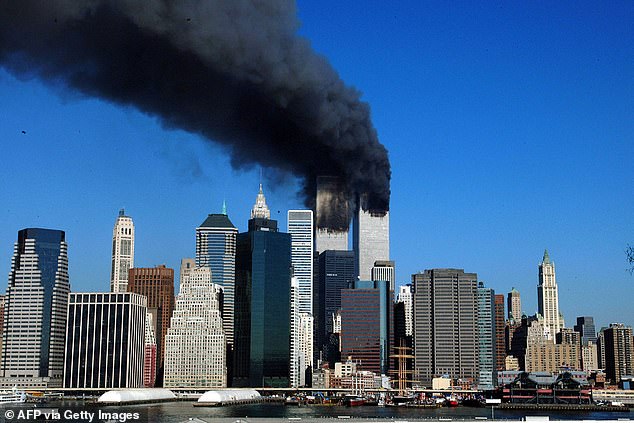
Could there be a moment, after this has happened, when we look back nostalgically at the post-9/11 world order? Pictured, the twin towers of the World Trade Center billow smoke after hijacked planes crashed into them early on September 11, 2001
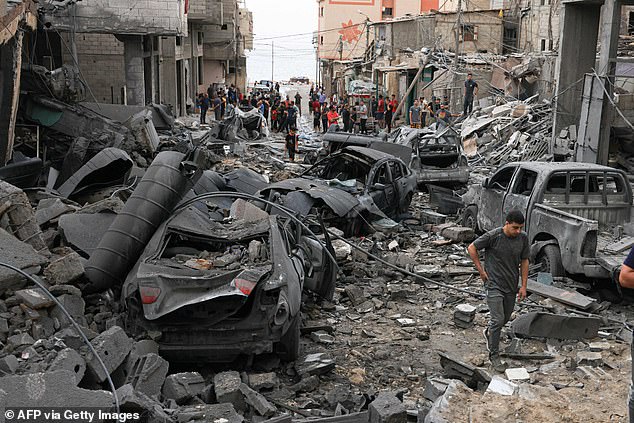
It is no exaggeration to argue that the primitive savagery displayed by Hamas at the weekend has caused a geopolitical earthquake. In the photo, Palestinians inspect the destruction in a neighborhood badly damaged by Israeli airstrikes
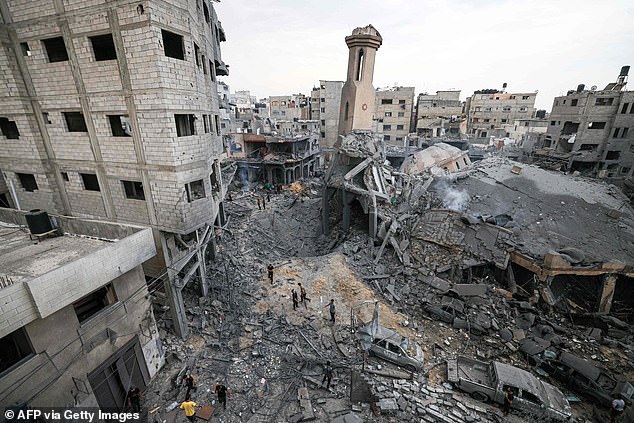
Provocation of Israel also enables Hamas and Iran to drum up sympathy for the Palestinian cause throughout the Middle East. In the photo, people stand among the ruins of a destroyed mosque
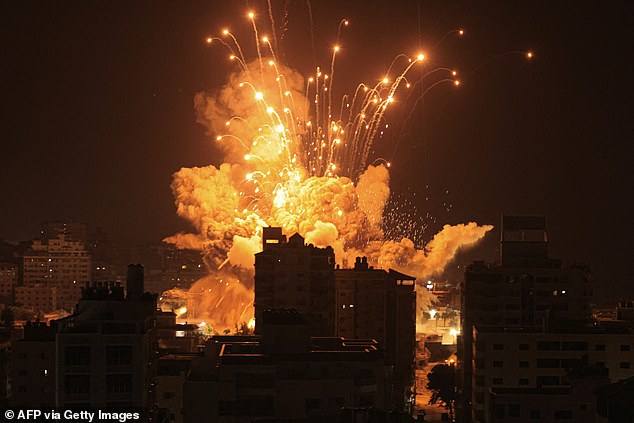
Retaliatory bombing by the Israelis will further the Palestinian cause, encouraging fundamentalism and thus weakening moderate Arab governments like Egypt’s. In the photo, a rocket explodes in Gaza City during an Israeli airstrike
The element of surprise and the horrific death toll have inevitably led to comparisons between the bloody Hamas offensive and 9/11 in New York.
In fact, Al Qaeda then posed no risk of starting a world war, and Bin Laden had no plans for what to do after his atrocity.
Conversely, Hamas’s indiscriminate attack on Israel could change the world order.
As reported, Hamas is financed by Iran. The terrorist group’s weaponry, including the rockets that rained down on Israel at the weekend, were designed and paid for by Tehran.
The Ayatollahs have very specific goals in using Hamas against Israel.
A key goal is to undo the thawing of relations between the Jewish state and other Middle Eastern nations—Saudi Arabia, the United Arab Emirates, Bahrain, Morocco, and Sudan—that occurred between September 2020 and January 2021 with the signing of the Abraham Accords during The presidency of Donald Trump (who, contrary to his fiery, warmongering image, was actually an advocate of peace and cooperation in the Middle East).
Tehran hates this reconciliation process. The Ayatollahs deny that the state of Israel has any right to exist and insist that it must be wiped off the face of the earth. Any peace process that ends Israel’s isolation will push Iran further into the cold.
Provocation of Israel also enables Hamas and Iran to drum up sympathy for the Palestinian cause throughout the Middle East.
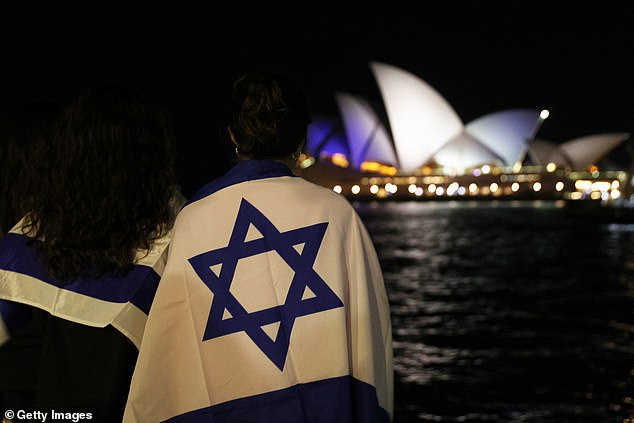
People watch as the colors of the Israeli flag are projected onto the Sydney Opera House
Contrary to most Western reports, the terrorists’ cynical massacre of defenseless civilians, rape of women and kidnapping of others, receive little mention in the Arab media.
Rather, the images of the ‘victims’ of Israeli retaliation are the ones shown on television stations across the Middle East.
At the heart of this maelstrom, Arab leaders now face pressure from below to pick a side. Saudi Arabia has already canceled any plans to deal with Israel and appears to blame Israel for the violence inflicted on it.
Iran enjoys several other benefits from igniting this proxy war. One is to establish its Shiite brand of Islam as Israel’s main enemy, eclipsing the influence of Saudi Arabia, which supports the alternative Sunni faith.
Tehran can trumpet to the Muslim world the ideological purity of the Shia code, in contrast to Riyadh, whose Sunni regime they will portray as fatally compromised by efforts to get closer to Israel.
Retaliatory bombing by the Israelis will further the Palestinian cause, encouraging fundamentalism and thereby weakening moderate Arab governments such as Egypt’s – which will be further destabilized by large flows of refugees from Gaza.
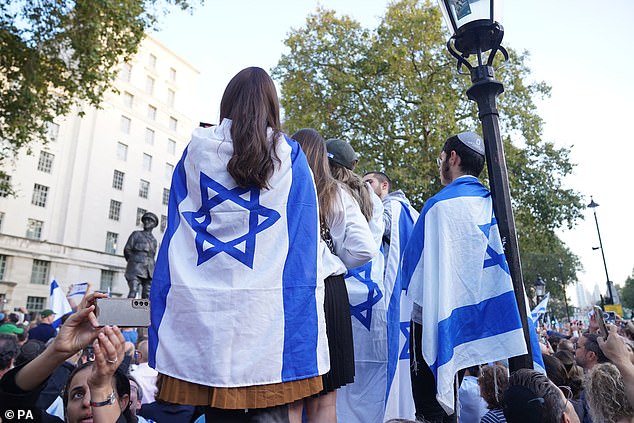
Contrary to most Western reports, the terrorists’ cynical massacre of defenseless civilians, rape of women and kidnapping of others, receive little mention in the Arab media. Pictured against protesters at a Palestinian Solidarity Campaign demonstration near the Israeli embassy in Kensington
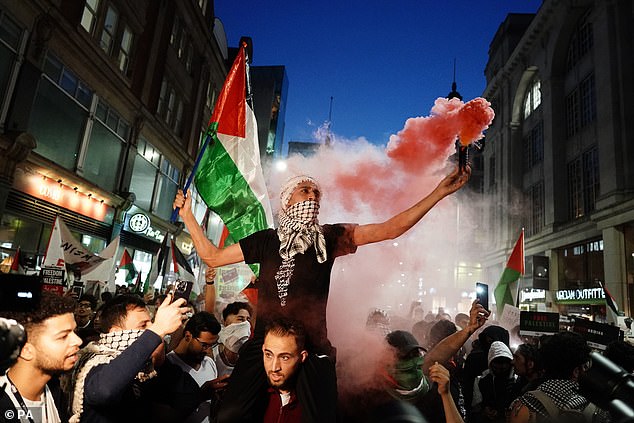
Pictured, the Palestine Solidarity Campaign demonstration in London with supporters waving Palestinian flags
Elsewhere, Iran will now benefit (as will Russia) from the inevitable rise in oil prices as the risks of a wider Middle East war increase. Meanwhile, already stuttering Western economies face a 1973-style oil price shock that could wreak havoc as each country tries to save its own industry.
Then there are the military implications of this conflict.
An emboldened Iran will extend the export of its missile and drone technology, which is already playing an important role for Russia in its campaign against Ukraine.
Indeed, Moscow, although it has had good relations with Israel, has much to gain from a new conflict in the Middle East.
The US is likely to feel pressure to bolster Israel’s defenses against Hamas rockets with weapons like the highly effective Patriot surface-to-air missile system.
America does not have a large reserve of these Patriots, and Israel will have priority, which means that there will be much less for the government of President Zelensky.
So Moscow and Tehran stand to benefit greatly from a protracted conflict that draws in Israel’s neighbors.
For us in the West, things will be much worse than they were after the Yom Kippur War exactly half a century ago, which generated the shock of 1973.
Our national grid is already struggling to cope with high demand, but we can go back to blackouts and the three-day week.
Then Britain was the basket case, but tomorrow a spike in oil prices could wreak havoc on a fragile global economy.
Above all, it would be the West – Europe, America and Japan – that would take the economic hit, not Russia or China.
At a time when the West needs solutions from above, the aging White House leader is a figure whose mental abilities and grasp of politics fail to inspire any confidence.
President Joe Biden’s sense of weakness was epitomized in his ridiculously unbalanced deal with Tehran last month, in which the US paid a $6 billion ransom in exchange for the release of just five prisoners held in Iran.
It equated to a direct incitement to hostage-taking, which may explain why Hamas has adopted this tactic in its latest attack.
American distraction in the Middle East will also be welcomed by China and North Korea, who will feel they have more room to fulfill their territorial and nuclear ambitions in the Pacific.
Amid a deepening Cold War in the Far East, China has adopted a posture of escalating threats to Taiwan and even the Philippines, and such threats will only be emboldened by the deployment of America’s largest aircraft carrier, the USS Gerald Ford, to east. The Mediterranean will strengthen Israel this week.
At the same time, the North Korean dictatorship, which already has strong military relations with Tehran, could use the current atmosphere of turmoil to threaten Japan or South Korea.
Suspicions that Kim Jong Un and the ayatollahs have been sharing nuclear know-how for years may now turn to Pyongyang to wrest a weapon or two from Iran. This would cause a crisis of Armageddon proportions with Israel and the West.
And if that wasn’t enough, the fallout from the Hamas attack could reignite the civil war in Syria.
President Assad’s government has moved soldiers to the Israeli border, leaving room for ISIS to re-emerge.
Meanwhile Turkey, a staunch supporter of Hamas, is feeling increasingly emboldened to launch an attack on restive Kurds there.
Next door in Lebanon, the powerful Shiite Islamist group Hezbollah may decide to use its large Iranian-supplied missile arsenal against Israel to show its ‘solidarity’ with Palestine.
Could there be a moment, after this has happened, when we look back nostalgically at the post-9/11 world order?
The prophecy of the great Irish poet WB Yeats seems very apt as the circles of crisis overlap and exacerbate each other.
“Things fall apart, the center cannot hold. Anarchy has simply disappeared from the world.’
Mark Almond is Director of the Institute of Crisis Research, Oxford
(tagsTranslate) Daily Mail(s) Debate(s) China(s) Russia(s) Hamas(s) Saudi Arabia(s) Israel(s) Donald Trump(s) 9/11 Attacks
